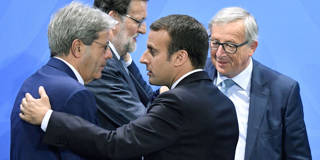With German Chancellor Angela Merkel still forming her new coalition government, it is impossible to say for certain what approach to integration Europe will take in the coming years. But reform of the EU and the eurozone will almost certainly not follow the highly ambitious path favored by European Commission President Jean-Claude Juncker.
WASHINGTON, DC – After a tumultuous year, politics seem to be stabilizing across Europe. Though the far-right Alternative für Deutschland (AfD) gained almost 13% of the vote in Germany’s recent federal election, it does not pose a serious threat to Chancellor Angela Merkel’s leadership. In France – the other pillar of the European project – President Emmanuel Macron can count on a solid parliamentary majority. And, despite the uncertainty surrounding the details of Brexit, there is little doubt that, whatever plans the European Union makes, it will be doing so without the United Kingdom as a member.
So now the question is how the EU and, in particular, the eurozone, will move forward. There are three possibilities.
The first option is a “more united union,” as described by European Commission President Jean-Claude Juncker in his state of the union address last month. Juncker’s vision rejects a multi-speed Europe, in favor of uniform steps by all EU members. This would mean, for starters, expanding the Schengen Area of border-free travel to include Bulgaria and Romania. Juncker also called for progress toward a European Social Standards Union embodying a shared understanding of welfare entitlement in the single market.

WASHINGTON, DC – After a tumultuous year, politics seem to be stabilizing across Europe. Though the far-right Alternative für Deutschland (AfD) gained almost 13% of the vote in Germany’s recent federal election, it does not pose a serious threat to Chancellor Angela Merkel’s leadership. In France – the other pillar of the European project – President Emmanuel Macron can count on a solid parliamentary majority. And, despite the uncertainty surrounding the details of Brexit, there is little doubt that, whatever plans the European Union makes, it will be doing so without the United Kingdom as a member.
So now the question is how the EU and, in particular, the eurozone, will move forward. There are three possibilities.
The first option is a “more united union,” as described by European Commission President Jean-Claude Juncker in his state of the union address last month. Juncker’s vision rejects a multi-speed Europe, in favor of uniform steps by all EU members. This would mean, for starters, expanding the Schengen Area of border-free travel to include Bulgaria and Romania. Juncker also called for progress toward a European Social Standards Union embodying a shared understanding of welfare entitlement in the single market.